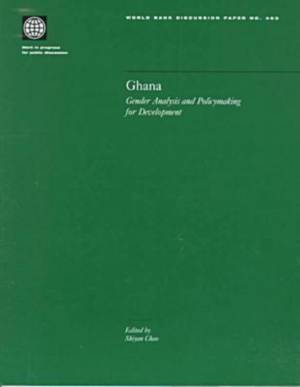
- Afhalen na 1 uur in een winkel met voorraad
- Gratis thuislevering in België vanaf € 30
- Ruim aanbod met 7 miljoen producten
- Afhalen na 1 uur in een winkel met voorraad
- Gratis thuislevering in België vanaf € 30
- Ruim aanbod met 7 miljoen producten
Zoeken
Omschrijving
'Ghana is an extremely diverse country-ethnically, culturally, ecologically, and economically. Women and men play different roles, undertake different activities, and face different constraints. Gender-based differences in their activities and practices result from... existing gender inequalities. Because these gender differences are often fundamental to men and women's livelihoods, understanding them is essential to designing policies and projects that will effectively reduce gender inequalities and promote sustainable development.' A growing body of literature indicates that reducing gender inequalities and increasing women's access to productive resources greatly improves both welfare and economic productivity. Despite recent gains in some areas, significant gender inequalities continue to limit women's capabilities and constrain their ability to participate in and contribute to Ghana's economy. This report examines key gender inequalities and gender-based differences in economic activities, opportunities, and constraints, focusing on two broad areas: the links between gender, economic productivity and poverty, and the development of human capital. It is the result of the World Bank's recognition of the need to understand gender issues in order to develop strategies to deal with them and support the government's program to develop a gender strategy. In addition, it is intended to further the dialogue between the Bank, the government, other donors, and nongovernmental organizations (NGOs) on how to reduce or eliminate gender-specific constraints on economic development in Ghana.
Specificaties
Betrokkenen
- Auteur(s):
- Uitgeverij:
Inhoud
- Aantal bladzijden:
- 84
- Taal:
- Engels
- Reeks:
- Reeksnummer:
- nr. 403
Eigenschappen
- Productcode (EAN):
- 9780821345306
- Verschijningsdatum:
- 15/09/1999
- Uitvoering:
- Paperback
- Formaat:
- Trade paperback (VS)
- Afmetingen:
- 235 mm x 235 mm
- Gewicht:
- 204 g

Alleen bij Standaard Boekhandel
+ 50 punten op je klantenkaart van Standaard Boekhandel
Beoordelingen
We publiceren alleen reviews die voldoen aan de voorwaarden voor reviews. Bekijk onze voorwaarden voor reviews.











